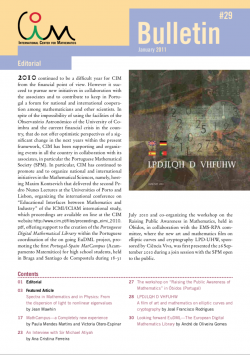Editorial
1-2
2010 continued to be a difficult year for CIM from the financial point of view. However it succeed to pursue new initiatives in collaboration with the associates and to contribute to keep in Portugal a forum for national and international cooperation among mathematicians and other scientists.
Spectra in Mathematics and in Physics: From the dispersion of light to nonlinear eigenvalues
Jean Mawhin
3-13
This lecture deals with the concept of spectrum in various epochs, with various meanings and for various disciplines. Its content can be motivated by a quotation of L.A. STEEN
Coming Events
13-16
- Pedro Nunes Lectures - 2011
- 3rd Porto Meeting on Mathematics for Industry, Porto, Portugal,
- Summer Course and Workshop on Optimization in Machine Learning, Austin, Texas, USA
- CoLab Mathematics Summer School and Workshop, Instituto Superior Técnico
- Dynamical Models in Life Sciences, University of Évora
- Optimization 2011, Universidade Nova de Lisboa
- Groups and Semigroups: Interactions and Computations, University of Lisbon
- Elementary Geometry from an Advanced Point of View, University of Aveiro
- O Caos e o Acaso
- Forward Look Mathematics and Industry
MatcamPus2010 - a completely new experience
Paula Mendes Martins
Victoria Otero-Espinar
17-22
If you had visited the University of Minho and the University of Santiago de Compostela last July, you would find a different environment. Forty teenagers from Portugal and Galiza, together with four high school teachers participated in the meeting MatCampus 2010 - a mathematical camp between Portugal and Spain, from the 18th to the 31st of July.
Sir Michael Atiyah
Ana Cristina Ferreira
23-26
Sir Michael Atiyah is one of the most well-known and important mathematicians of the past century. He has had a long and distinguished career, receiving both the Fields of the past century. He has had a long and distinguished career, receiving both
Medal in 1966 and the Abel Prize in 2004. Some of his most significant contributions include the Atiyah-Singer Index Theorem and topological K-theory, and he remains active to this day. His planned visit to Portugal to deliver the Pedro Nunes lectures was disrupted by the Icelandic volcano eruption last spring and is now rescheduled for the period between 27 March and 7 April 2011.
This year Óbidos hosted again an international workshop: “Raising the Public Awareness of Mathematics” (organizers: E. Behrends, Berlin; N. Crato, Lisbon; J.F. Rodrigues, Lisbon; see http://c2.glocos.org/index. php/RPAM/rpam2010).
LPDJIQH D VHFUHW A film of art and mathematics on elliptic curves and cryptography
José Francisco Rodrigues
28-29
Pythagorean triples such as (3, 4, 5) or (4961, 6480, 8161) were well known by ancient Babylonians around 1600 B.C. They were also aware of their correspondence to right triangles with integer sides and to the problem of splitting a given square number into two squares. Although such triples have been studied in detail since the time of Euclid, around 300 B.C., it was only in the middle of the XVII century that Pierre de Fermat stated the famous observation:
“No cube can be split into two cubes, nor any biquadrate into two biquadrates, nor generally any power beyond the second into two of the same kind”.
Looking forward EuDML - the European Digital Mathematics Library
André de Oliveira Gomes
30-34
The present article intends to give some information about EuDML project, an European project that aims to “deliver a truly open, sustainable and innovative framework for access and exploitation of Europe’s rich heritage of mathematics”, and stress the importance of building an emerging PtDML (Portuguese Digital Mathematics Library) in this context of change [1]. EuDML is funded by the ICT Policy support Programme of the European Commission, coordinated by a research team of the Computer Science Department of IST (Instituto Superior Técnico) at the Technical University of Lisbon, led by José Luís Borbinha, the project scientific coordinator.
